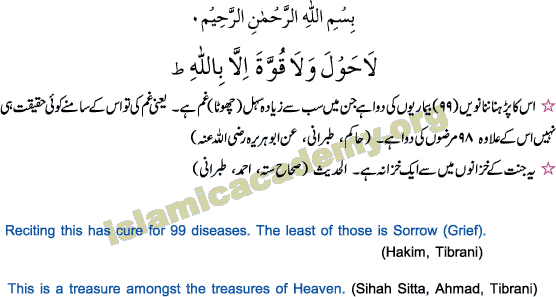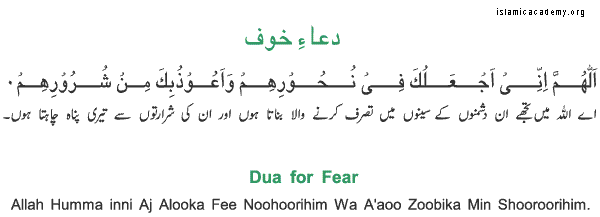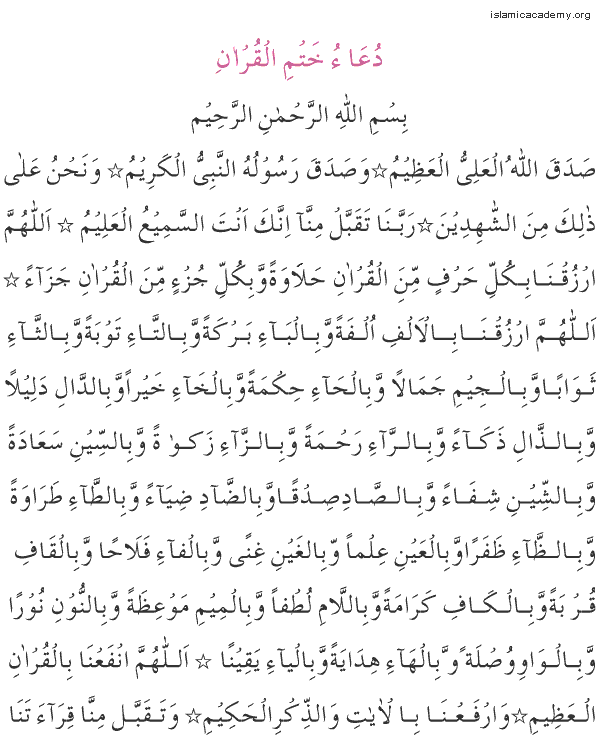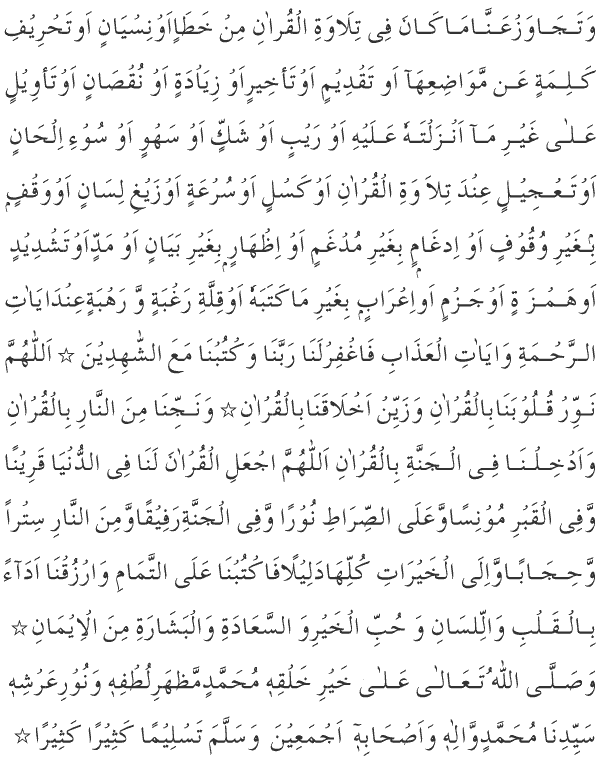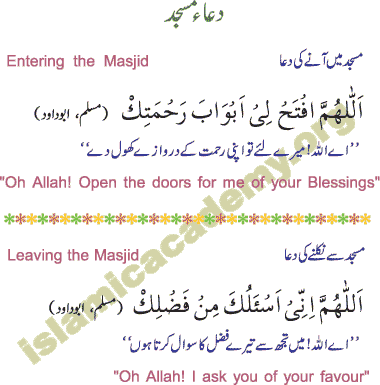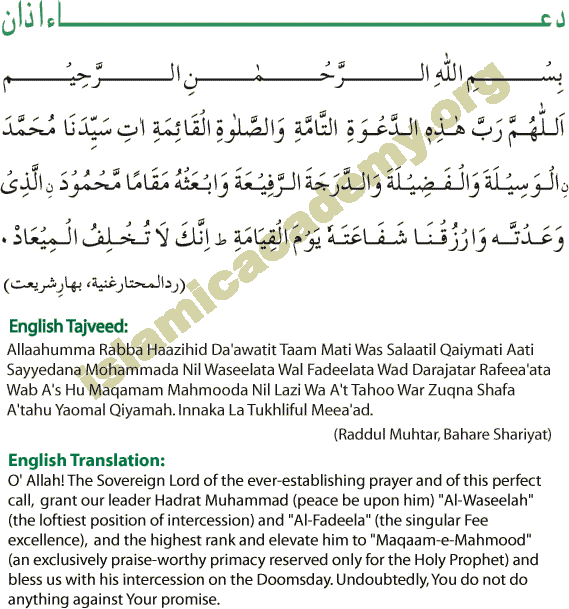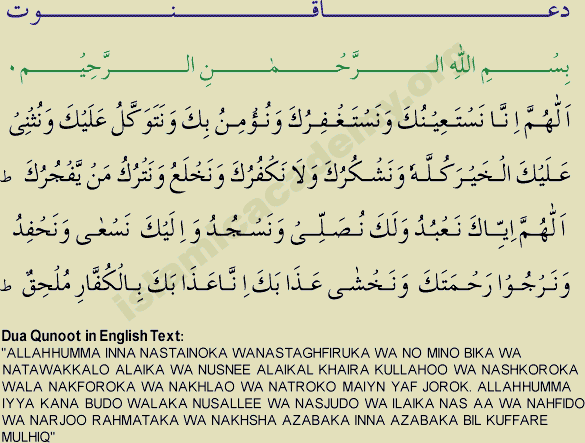 |
| 1. Our Lord! Grant us good in this world and good in the life to come and keep us safe from the torment of the Fire ( |
 |
| 2. Our Lord! Bestow on us endurance and make our foothold sure and give us help against those who reject faith. ( |
 |
| 3. Our Lord! Take us not to task if we forget or fall into error. |
 |
| 4. Our Lord! Lay not upon us such a burden as You did lay upon those before us. |
 |
| 5. Our Lord! Impose not on us that which we have not the strength to bear, grant us forgiveness and have mercy on us. You are our Protector. Help us against those who deny the truth. |
 |
| 6. Our Lord! Let not our hearts deviate from the truth after You have guided us, and bestow upon us mercy from Your grace. Verily You are the Giver of bounties without measure. |
 |
| 7. Our Lord! Forgive us our sins and the lack of moderation in our doings, and make firm our steps and succour us against those who deny the truth. |
 |
| 8. Our Lord! Whomsoever You shall commit to the Fire, truly You have brought [him] to disgrace, and never will wrongdoers find any helpers. |
 |
| 9. Our Lord! Behold we have heard a voice calling us unto faith: "Believe in your Lord" and we have believed. |
 |
| 10. Our Lord! Forgive us our sins and efface our bad deeds and take our souls in the company of the righteous. |
 |
| 11. Our Lord! And grant us that which you have promised to us by Your messengers and save us from shame on the Day of Judgement. Verily You never fail to fulfill Your promise. |
 |
| 12. Our Lord! We have sinned against ourselves, and unless You grant us forgiveness and bestow Your mercy upon us, we shall most certainly be lost! |
 |
| 13. Our Lord! Place us not among the people who have been guilty of evildoing. |
 |
| 14. Our Lord! Lay open the truth between us and our people, for You are the best of all to lay open the truth. |
 |
| 15. Our Lord! Pour out on us patience and constancy, and make us die as those who have surrendered themselves unto You. |
 |
| 16. Our Lord! Make us not a trial for the evildoing folk, and save as by Your mercy from people who deny the truth |
 |
| 17. Our Lord! You truly know all that we may hide [in our hearts] as well as all that we bring into the open, for nothing whatever, be it on earth or in heaven, remains hidden from Allah |
 |
| 18. Our Lord! Bestow on us mercy from Your presence and dispose of our affairs for us in the right way. |
 |
| 19. Our Lord! Grant that our spouses and our offspring be a comfort to our eyes, and give us the grace to lead those who are conscious of You. |
 |
| 20. Our Lord! You embrace all things within Your Grace and Knowledge, forgive those who repent and follow Your path, and ward off from them the punishment of Hell. |
 |
| 21. Our Lord! Make them enter the Garden of Eden which You have promised to them, and to the righteous from among their fathers, their wives and their offspring, for verily You are alone the Almighty and the truly Wise. |
 |
| 22. Our Lord! Relieve us of the torment, for we do really believe. |
 |
| 23. Our Lord! Forgive us our sins as well as those of our brethren who proceeded us in faith and let not our hearts entertain any unworthy thoughts or feelings against [any of] those who have believed. Our Lord! You are indeed full of kindness and Most Merciful |
 |
| 24. Our Lord! In You we have placed our trust, and to You do we turn in repentance, for unto You is the end of all journeys. |
 |
| 25. Our Lord! Perfect our light for us and forgive us our sins, for verily You have power over all things. |
Pages
- Home
- Islamic Proofs
- Life of Prophets
- Quran with Tarjuma
- Quran In English
- Sahi Bukhari Vol-1 and 2 (Hadith)
- Signs Of Qayamat (Apocalypse)
- Duas
- Islamic Quotes And Sayings
- Download Islamic Materials
- Zakir Naik (Videos)
- Sheik Sanaullah Madani (Videos)
- Shaik Faizur Rahman (Videos)
- Quran Memorizer
- Hadith's (Download & Read Online)
- Muslim Baby Names (Boys)
- Muslim Baby Names (Girls)
- ALL DOWNLOADS (NeW)
Welcome
Welcum to Islamic World... Now You Can Visit this site by these Addresses...(www.islamforearth.co.cc) & (www.planetislam.co.nr)...
Friday, August 28, 2009
25 Duas From The Holy Qur'an...
The Way Of Qurbani...
Place the animal of Qurbani on the left side in such a way that its’ face is towards the Qibla and put the left leg on its side. And say this duaa before slaughtering:

Then slaughter the animal with a sharp knife whilst reading:
![]()
If the Qurbani is for oneself then read the following duaa after the zabh (slaughter):

If the Qurbani is on another’s behalf then in the above arabic dua replace ![]() with
with ![]() , then the name of the person
, then the name of the person
If the animal is shared then read the duaa by writing it down like so:
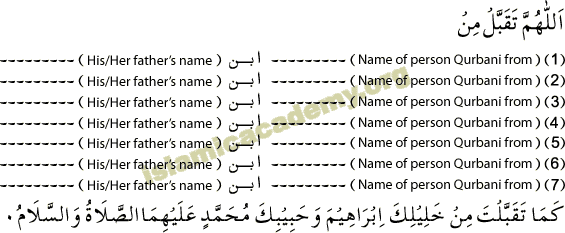
Ayatul Kursi...
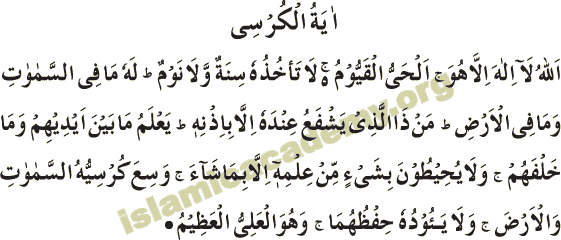
Rasool Allah peace be upon him said, "Whoever recites Aayatul Kursi after every Fard (Fard Salat). Only death is keeping him/her from entering Jannah. (As soon as he/she dies, will enter Jannah)
(Nisa'i, Ibne Habban, Ibnelsani A'n Abi Amatah Albahili Radiallah Anhu)
It's in another Hadis that Reciting Ayatul Kursi after one Fard (Fard Salat) will stay in Allah's protection until the next Salat.
(Tibrani Fil Kabeer, A'n Alhasan Bin Ali Radiallah Anhu)
Imam Bihaqi States that the one who recites Ayatul Kursi before falling asleep, Allah Tala gives protection to his/her home and his/her Family.
(Marqat Sharah Mishkaat, Mulla Ali Qaderi, vol. 2 pp. 583)
It's in another Hadis Jinns and Shaitans do not come close to the house in which Ayatul Kursi is recited. (Tirmizi Altargheeb Wal Tarheeb Lilmanzari vol.2 pp.631)
Hadrat A'isha Radiallah Anha states that a person arrived in the court of Nabi kareem Sallal Laaho Alaihi Wasallam and complained that there is no Barkat (Blessings) in anything in his home. Rasool Allah peace be upon him said, "You do not recite Ayatul Kursi, whichever Food and Curry you will recite Ayatul Kursi on, Allah Tala will give Blessings on that Food and Curry. (Tafseer Dar Manshoor vol. 1 pp. 323)
BLACK STONE (Al-Hajr-Ul-Aswad)

The Black Stone (called الحجر الأسود al-Hajar-ul-Aswad in Arabic) also called as "Hijre Aswad" is a Muslim relic, which according to Islamic tradition dates back to the time of Adam and Eve. Some consider it to be a tektite or a meteorite.[1] It is the eastern cornerstone of the Kaaba, the ancient sacred stone building towards which Muslims pray, in the center of the Grand Mosque in Mecca, Saudi Arabia.[2] The Stone is roughly 30 cm (12 in.) in diameter, and 1.5 meters (5 ft.) above the ground.[3]
When pilgrims circle the Kaaba as part of the Tawaf ritual of the Hajj, many of them try, if possible, to stop and kiss the Black Stone, emulating the kiss that it, according to Islamic lore, received from the Islamic prophet Muhammad.[4] If they cannot reach it, they point to it on each of their seven circuits around the Kaaba.[5]
The Stone is broken into a number of pieces from damage which was inflicted during the Middle Ages. The pieces are held together by a silver frame, which is fastened by silver nails to the Stone.
ZAMZAM WELL
Origin of Zamzam
Islamic history states that Zamzam well was revealed to Hajar, the wife of Abraham (Ibrahim) and mother of Ismael,[2] around the year 2000 BC. According to Islamic tradition, she was desperately seeking water for her infant son, but could find none, as Mecca is located in a hot dry valley with few sources of water. Muslim traditions say that Hajar ran seven times back and forth in the scorching heat between the two hills of Safa and Marwah, looking for water. Getting thirstier by the second, her son, Ismael anxiously scraped the land with his feet, where suddenly water sprang out. There are other versions of the story involving Allah sending his angel, Gabriel, who touched the ground where water rose.[3]
The name of the well comes from the phrase Zomë Zomë, meaning ‘accumulate’, a command repeated by Hajar during her attempt to contain the spring water.[1]
According to Islamic tradition, Abraham rebuilt the Bait-ul-Allah (House of Allah) at the site of the well, a building which had been originally constructed by Adam, and today is called the Kaaba, a building towards which all Muslims around the world face in prayer, five times each day. The Zamzam well is located approximately 20 meters east of the Kaaba.[
UMRAH...
HAJJ

The Hajj (Arabic: حج Ḥaǧǧ) is a pilgrimage to Mecca (Makkah). It is currently the largest annual pilgrimage in the world,[1] and is the fifth pillar of Islam, an obligation that must be carried out at least once in their lifetime by every able-bodied Muslim who can afford to do so. The Hajj is a demonstration of the solidarity of the Muslim people, and their submission to Allah(God).[2] The pilgrimage occurs from the 8th to 12th day of Dhu al-Hijjah, the 12th month of the Islamic calendar. Because the Islamic calendar is a lunar calendar, eleven days shorter than the Gregorian calendar used in the Western world, the Gregorian date of the Hajj changes from year to year. In 2007, the Hajj was from December 17–21; in 2008 from December 6–10, and in 2009 will be November 25–29. Ihram is the name given to the special state in which Muslims live whilst on the pilgrimage.
The Hajj is associated with the life of Islamic prophet Muhammad from the 7th century, but the ritual of pilgrimage to Mecca is considered by Muslims to stretch back thousands of years to the time of Ibrahim (Abraham). Pilgrims join processions of hundreds of thousands of people, who simultaneously converge on Mecca for the week of the Hajj, and perform a series of rituals: Each person walks counter-clockwise seven times about the Ka'bah, the cube-shaped building which acts as the Muslim direction of prayer; kisses the Black Stone in the corner of the Kaaba; runs back and forth between the hills of Al-Safa and Al-Marwah; drinks from the Zamzam Well; goes to the plains of Mount Arafat to stand in vigil; and throws stones in a ritual Stoning of the Devil. The pilgrims then shave their heads, perform a ritual of animal sacrifice, and celebrate the three day global festival of Eid al-Adha.[3][4][5]
s of 2008, about three million pilgrims participate in this annual pilgrimage.[6][7] Crowd-control techniques have become critical, and because of the large numbers of people, many of the rituals have become more stylized. It is not necessary to kiss the Black Stone, but merely to point at it on each circuit around the Kaaba. Throwing pebbles was done at large pillars, which for safety reasons in 2004 were changed to long walls with catch basins below to catch the stones. The slaughter of an animal can be done either personally, or by appointing someone else to do it, and so forth.[8] But even with the crowd control techniques, there are still many incidents during the Hajj, as pilgrims are trampled in a crush, or ramps collapse under the weight of the many visitors, causing hundreds of deaths. The Kingdom of Saudi Arabia's Ministry of Hajj has a website, with the message, "Be peaceful, orderly and kind. No crushing."[9]Pilgrims can also go to Mecca to perform the rituals at other times of the year. This is sometimes called the "lesser pilgrimage", or Umrah. However, even if they perform the Umrah, they are still obligated to perform the Hajj at some other point in their lifetimes if they have the means to do so.
HAJJ
The Hajj (Arabic: حج Ḥaǧǧ) is a pilgrimage to Mecca (Makkah). It is currently the largest annual pilgrimage in the world,[1] and is the fifth pillar of Islam, an obligation that must be carried out at least once in their lifetime by every able-bodied Muslim who can afford to do so. The Hajj is a demonstration of the solidarity of the Muslim people, and their submission to Allah(God).[2] The pilgrimage occurs from the 8th to 12th day of Dhu al-Hijjah, the 12th month of the Islamic calendar. Because the Islamic calendar is a lunar calendar, eleven days shorter than the Gregorian calendar used in the Western world, the Gregorian date of the Hajj changes from year to year. In 2007, the Hajj was from December 17–21; in 2008 from December 6–10, and in 2009 will be November 25–29. Ihram is the name given to the special state in which Muslims live whilst on the pilgrimage.
The Hajj is associated with the life of Islamic prophet Muhammad from the 7th century, but the ritual of pilgrimage to Mecca is considered by Muslims to stretch back thousands of years to the time of Ibrahim (Abraham). Pilgrims join processions of hundreds of thousands of people, who simultaneously converge on Mecca for the week of the Hajj, and perform a series of rituals: Each person walks counter-clockwise seven times about the Ka'bah, the cube-shaped building which acts as the Muslim direction of prayer; kisses the Black Stone in the corner of the Kaaba; runs back and forth between the hills of Al-Safa and Al-Marwah; drinks from the Zamzam Well; goes to the plains of Mount Arafat to stand in vigil; and throws stones in a ritual Stoning of the Devil. The pilgrims then shave their heads, perform a ritual of animal sacrifice, and celebrate the three day global festival of Eid al-Adha.[3][4][5]
s of 2008, about three million pilgrims participate in this annual pilgrimage.[6][7] Crowd-control techniques have become critical, and because of the large numbers of people, many of the rituals have become more stylized. It is not necessary to kiss the Black Stone, but merely to point at it on each circuit around the Kaaba. Throwing pebbles was done at large pillars, which for safety reasons in 2004 were changed to long walls with catch basins below to catch the stones. The slaughter of an animal can be done either personally, or by appointing someone else to do it, and so forth.[8] But even with the crowd control techniques, there are still many incidents during the Hajj, as pilgrims are trampled in a crush, or ramps collapse under the weight of the many visitors, causing hundreds of deaths. The Kingdom of Saudi Arabia's Ministry of Hajj has a website, with the message, "Be peaceful, orderly and kind. No crushing."[9]Pilgrims can also go to Mecca to perform the rituals at other times of the year. This is sometimes called the "lesser pilgrimage", or Umrah. However, even if they perform the Umrah, they are still obligated to perform the Hajj at some other point in their lifetimes if they have the means to do so.
Battle Of Badr (Jung-E-Badr)
The Battle of Badr was a key battle in the early days of Islam and a turning point in Muhammad's struggle with his opponents among the Quraysh in Mecca.
In the spring of 624, Muhammad received word from his intelligence sources that a trade caravan, commanded by Abu Sufyan ibn Harb and guarded by thirty to forty men, was traveling from Syria back to Mecca. Muhammad gathered an army of 313 men, the largest army the Muslims had put in the field yet. However, many early Muslim sources, including the Qur'an, indicate that no serious fighting was expected,[15] and the future Caliph Uthman ibn Affan stayed behind to care for his sick wife.
As the caravan approached Medina, Abu Sufyan began hearing from travelers and riders about Muhammad's planned ambush. He sent a messenger named Damdam to Mecca to warn the Quraysh and get reinforcements. Alarmed, the Quraysh assembled an army of 900-1,000 men to rescue the caravan. Many of the Qurayshi nobles, including Amr ibn Hishām, Walid ibn Utba, Shaiba, and Umayyah ibn Khalaf, joined the army. However, some of the army was to later return to Mecca befor the battle
The battle started with champions from both armies emerging to engage in combat. The Muslims sent out Ali, Ubaydah ibn al-Harith (Obeida), and Hamza ibn ‘Abd al-Muttalib. The Muslims dispatched the Meccan champions in a three-on-three melee, Hamzah killed his victim on very first strike although Ubaydah was mortally wounded.[16]
Now both armies began firing arrows at each other. Two Muslims and an unknown number of Quraysh were killed. Before the battle started, Muhammad had given orders for the Muslims to attack with their ranged weapons, and only engage the Quraysh with melee weapons when they advanced.[17] Now he gave the order to charge, throwing a handful of pebbles at the Meccans in what was probably a traditional Arabian gesture while yelling "Defaced be those faces!"[18][19] The Muslim army yelled "Yā manṣūr amit!"[20] and rushed the Qurayshi lines. The Meccans, understrength and unenthusiastic about fighting, promptly broke and ran. The battle itself only lasted a few hours and was over by the early afternoon.[18]. The Qur'an describes the force of the Muslim attack in many verses, which refer to thousands of angels descending from Heaven at Badr to slaughter the Quraysh.[19][21] It should be noted that early Muslim sources take this account literally, and there are several hadith where Muhammad discusses the Angel Jibreel and the role he played in the battle.
Ubaydah ibn al-Harith (Obeida) was given the honour of "he who shot the first arrow for Islam" as Abu Sufyan ibn Harb altered course to flee the attack. In retaliation for this attack Abu Sufyan ibn Harb requested an armed force from Mecca.[22]
Throughout the winter and spring of 623 other raiding parties were sent by Muhammad from Medina.
Muhammad's agreement with the Jewish tribes soon broke down, as the Jews would not accept Muhammad's claims to prophethood or his growing influence. After his victory at Badr, Muhammad besieged and conquered the tribe of the Banu Qaynuqa, that had been involved in a tribal feud and adamantly refused to convert to Islam or keep peace with the Muslims. Because of the intercession of Abd-Allah ibn Ubayy and because it was the first incident with the tribes, Muhammad spared the tribe's lives and expelled them from the city.
Madinah...

Medina (pronounced /mɛˈdiːnə/; Arabic: المدينة المنورة, pronounced [ælmæˈdiːnæ lmuˈnɑw.wɑrɑ], or المدينة [ælmæˈdiːnæ]; also transliterated as Madinah; officially al-Madīnah al-Munawwarah) is a city in the Hejaz region of western Saudi Arabia, and serves as the capital of the Al Madinah Province. It is the second holiest city in Islam, and the burial place of the Islamic prophet Muhammad and it is historically significant for being his home after the Hijrah.
Muslim Brotherhood.........
The Muslim Brothers (Arabic: الإخوان المسلمون al-ikhwān al-muslimūn, full title The Society of the Muslim Brothers, often simply الإخوان al-ikhwān, the Brotherhood or MB) is a transnational Sunni movement and the largest political opposition organization in many Arab states, particularly Egypt.[1] The world's oldest and largest Islamic political group[1] was founded by the Egyptian schoolteacher Hassan al-Banna in 1928. The Brotherhood's stated goal is to instill the Qur'an and Sunnah as the "sole reference point for ... ordering the life of the Muslim family, individual, community ... and state".[2] Since its inception in 1928 the movement has officially opposed violent means to achieve its goals, [3][4] with some exceptions such as in the Israeli-Palestinian conflict or to overthrow secular Ba'athist rule in Syria (see Hama massacre). This position has been questioned, particularly by the Egyptian government, which accused the group of a campaign of killings in Egypt after World War II.[5]
The Brotherhood has been described as both unjustly oppressed and dangerously violent.[citation needed] Members have been arbitrarily arrested;[6][7] in Egypt the government has obstructed the party's attempts to field candidates in elections, with arrests or harassment of activists[8][9] and obstruction of voting in Muslim Brotherhood strongholds.[10] However, supporters of the Brotherhood have demonstrated violence on their part in many occasions and have often clashed with supporters of other parties, specifically the National Democratic Party (NDP) in Egypt. Outside of Egypt, the group's political activity has been described as evolving away from modernism and reformism towards a more traditional, "rightist conservative" stance. For example, the Muslim Brotherhood party in Kuwait opposes suffrage for women.[11] The Brotherhood's official opposition to terror against civilians and condemnation the 9/11[12][13] attacks is a matter of international controversy.[citation needed] Its position on violence has also caused disputes within the movement, with advocates of violence at times breaking away to form groups such as the Al-Gama'a al-Islamiyya (The Islamic Group) and Al Takfir Wal Hijra (Excommunication and Migration).[14]
Among the Brotherhood's more influential members was Sayyid Qutb. Qutb was the author of one of Islamism's most important books, Milestones, which called for the restoration of Islam by re-establishing the Sharia and by using "physical power and Jihad for abolishing the organizations and authorities of the Jahili system,"[15] which he believed to include the entire Muslim world.[16] While studying at university, Osama bin Laden claimed to have been influenced by the religious and political ideas of several professors with strong ties to the Muslim Brotherhood including both Sayyid Qutb and his brother Muhammad Qutb. While some have claimed that the Brotherhood's theology and methods are opposed to those of bin Laden, and that they are "reformist," "democratic," "non-violent" and "chiefly political",[17] some journalists have reported the opposite.[18][19][20][21][22]
The Brotherhood is financed by contributions from its members who are required to allocate portion of their income to the movement. Most of these contributions come from members living in oil-rich countries, such as Saudi ArabiaEid Ul-Fitr........
Fasting.....
The most prominent event of this month is fasting. Every day during the month of Ramadan, Muslims around the world get up before dawn to eat Sahur, the pre-dawn meal, then they perform the fajr prayer. They have to stop eating and drinking before the call for prayer starts until the fourth prayer of the day, Maghrib. Muslims may continue to eat and drink after the sun has set until the next morning's fajr prayer call. Then the process starts all over.
Ramadan is a time of reflecting and worshipping God. Muslims are expected to put more effort into following the teachings of Islam and to avoid obscene and irreligious sights and sounds. Sexual thoughts and activities during fasting hours are also forbidden.[Qur'an 2:187] Purity of both thoughts and actions is important. The fast is intended to be an exacting act of deep personal worship in which Muslims seek a raised awareness of closeness to God.
The act of fasting is said to redirect the heart away from worldly activities, its purpose being to cleanse the inner soul and free it from harm. It also allows Muslims to practice self-discipline, self-control [6], sacrifice, and empathy for those who are less fortunate; thus encouraging actions of generosity and charity. However, a certain level of self-control can be lost by those who suffer from eating disorders.[7]
The elderly, the chronically ill, and the mentally ill are exempt from fasting, although the first two groups must endeavor to feed the poor in place of their missed fasting. Also exempt are pregnant women, women during the period of their menstruation, and women nursing their newborns. A difference of opinion exists among Islamic scholars as to whether this last group must make up the days they miss at a later date, or feed poor people as a recompense for days missed.[8] While fasting is not considered compulsory in childhood, many children endeavor to complete as many fasts as possible as practice for later life. Lastly, those traveling are exempt, but must make up the days they miss.[Qur'an 2:184] More specifically, Twelver Shī‘ah define those who travel more than 14 miles in a day as exempt.[7]. The elderly or those who suffer from a disability or disease and have no prospect of getting better in the future can pay the cost of Iftar for a person who cannot afford it, or else they can host him in their house and have him eat with them after sunset as a way of repaying for the days they could not fast. [Qur'an 2:184]
A person who is observing Ramadan might break the fast accidentally, due to having forgotten it. In such an instance, one should spit out the food being eaten or cease the forbidden activity, immediately upon remembering the fast. This can usually happen in the first or early days of Ramadan because that person might have not yet been acclimated into fasting from dawn till dusk.
When Ramadan came to overshadow Ashura in importance, it took on some characteristics of the latter. According to a well-known hadith, the person who observes Ramadan properly will have all their past sins forgiven. According to another, "When Ramadan arrives, Heaven's gates are opened, Hell's gates are closed, and the demons are chained up" and who ever passes away will enter paradise. [9]
There are exceptions in certain Muslim communities that deny practicing fasting in Ramadān such as Alevi people in Turkey.Origns Of Ramadan......
The name "Ramaḍāma" had been the name of the ninth month in the Arab world long before the arrival of Islam; the word itself derived from an Arabic root rmḍ, as in words like "ramiḍa" or "ar-ramaḍ" denoting intense heat[2], scorched ground and shortness of rations. In the Qu'ran, God proclaims that "fasting has been written down (as obligatory) upon you, as it was upon those before you". According to the earliest hadith, this refers to the Jewish practice of fasting on Yom Kippur.[3][4]
Laylat al-Qadr, considered the most holy night of the year, is the night in which the Qur'an was revealed to Muhammad, the "Night of the Power".[5] Muslims believe it to have occurred on an odd-numbered night during the last 10 days of Ramaḍān, either the night of the 21st, 23rd, 25th, 27th or 29th (in Sunni thought) or the 19th, 21st or 23rd (in Shi'a thought). Ramaḍān ends with Eid ul-Fitr on the 1 of Shawwal, with much celebration and feasts. During the month following Ramaḍān, called Shawwal, Muslims are encouraged to fast for a further six days, known as as-Sitta al-Bīḍ, or "the white six." When fasting is over, Muslims go to Mosques in nice clothes to pray the first Eid prayer. They give out presents to the young ones and greet their friends and families. They then thank God for what He has given them.RAMADAN
NAMAZ
Obligatory daily Namaz
It is obligatory to perform the following five prayers during day and night:
- Dawn prayers (Fajr) - 2 Rak'ats.
- Midday (Zuhr) and Afternoon prayers ('Asr) - each one consisting of 4 Rak'ats.
- Dusk prayers (Maghrib) - 3 Rak'ats and Night prayers ('Isha) - 4 Rak'ats.
Namaz-e-Jumuah
Friday prayers consists of 2 Rak'ats like Fajr prayers. The difference between these two prayers is that Namaz-e-Jumuah has two sermons before it. Namaz-e-Jumuah is Wajib Takhyiri, which means that we have an option to offer Jumuah prayers, if its necessary conditions are fulfilled, or to offer Zuhr prayers. Hence, if Namaz-e-Jumuah is offered then it is not necessary to offer Zuhr prayer.
The following conditions must be fulfilled for Jumuah prayers to become obligatory:
- The time for Jumuah prayers should have set in. And that means that the midday time should have begun to decline. The time for Namaz-e-Jumuah is the earliest part of Zuhr. If it is very much delayed, then Namaz-e-Jumuah time will be over, and Zuhr Namaz will have to be prayed.
- The number of persons joining Namaz-e-Jumuah should be at least five, including the Imam. If there are less than five people, Namaz-e-Jumuah would not become obligatory.
- The Imam should fulfil the necessary conditions for leading the prayers. These conditions include righteousness ('Adalat) and other qualities which are required of an Imam and which will be mentioned in connection with the congregational prayers. In absence of an Imam qualifying to lead, Namaz-e-Jumuah will not be obligatory.
The following conditions should be fulfilled for the Namaz-e-Jumuah to be correct:
- The prayers should be offered in congregation. Hence, Namaz-e-Jumuah cannot be prayed alone. If a person joins Namaz-e-Jumuah before the Ruku of the second Rak'at his prayers will be valid and he will have to add another Rak'at to complete it. But, if he joins the Imam in the Ruku of the second Rak'at then the prayers may not suffice, and as a measure of precaution Zuhr Namaz should be prayed.
- Two sermons should be delivered before the prayers. In the first sermon the preacher should praise Allah and exhort the people to observe piety, and then he should also recite a short chapter (Surah) from the holy Qur'an. Thereafter he should sit down for a while and then stand up again. This time also he should praise Allah and invoke peace and blessings upon the holy Prophet and the holy Imams and, as a recommended precaution, seek forgiveness for the believers. It is necessary that the two sermons should precede the Namaz.
It will not be correct to offer the prayers before the two sermons. And, it is not permissible to deliver the sermons before Zuhr time has set in. It is also necessary that the preacher should be standing while delivering the sermons. Hence, if he delivers sermons while sitting, it will not be in order. It is also necessary and obligatory that there should be a break between the two sermons by way of sitting down during the interval for a while. It is also necessary that the preacher who delivers the sermons should also lead the prayers.
Taharat may not be a condition for delivering the sermons, but as a precaution, it should be maintained. As far as the glory of Allah, invocation of prayers and mercy upon the Prophet and the Imams are concerned, it must be rendered in Arabic, but the rest of it need not be in Arabic. In fact, if the majority in the audience are non-Arabs, then as an obligatory precaution, words of admonition and exhorting people to be pious and virtuous should be delivered in their language. - The distance between the two places where Namaze-Jumuah are offered should not be less than one Farsakh (3 miles). Hence if the distance between the two places is lesser and both the prayers commence at one and the same time both will be void. And if one of those prayers precedes the other (even to the extent of Takbiratul-ehram i.e. the first Takbir) the one which precedes will be in order and the other will be void.
If, it transpires after the Namaz-e-Jumuah is over that another Namaz-e-Jumuah had commenced earlier or simultaneously at a distance of less than farsakh, it will not be obligatory to offer Zuhr prayers. It is immaterial whether this information is received within the time or later. Moreover, a Namaz-e-Jumuah can stop another from being held within the stipulated distance only if it is itself valid, comprising of all conditions, otherwise it cannot have any prohibitive effect.
Rules regarding Namaz times
A person can start offering prayers only when be becomes certain that the time has set in or when two just (Adil) persons inform that the time has set in. In fact, one can rely upon the Adhan, or on advice of a person who knows the timings and is reliable.
If a person cannot be certain about the Prime time for prayers due to a personal handicap like blindness or being in the prison cell, he should delay the prayer till such time when he feels sure that the time has set in. And as an obligatory precaution, he should act the same way when there are general hindrances like dust or clouds.
If a person is satisfied on the basis of any one of the above methods that the time for prayers has set in and he begins offering prayers, but then realises during the prayers that the time has not yet set in, his prayer is void. And the position is the same if he realises after the prayers that he has offered the entire prayers before time. However, if one learns as he prays that the time has just entered or if he learns after the prayers that the time entered while he was in the process of praying, his Namaz will be valid.
Rules of Qibla
Our Qibla is the holy Ka'bah, which is situated in Makkah, and one should offer one's prayers facing it. However, a person who is far, would stand in such a manner that people would say that he is praying facing the Qibla, and that would suffice. This also applies to other acts which should be performed facing the Qibla like, while slaughtering an animal etc.
A person offering obligatory prayers while standing should have his chest and stomach facing the Qibla, and his face should not digress from Qibla, and the recommended precaution is that the toes of his feet should also be facing Qibla.
If a person offers prayers while sitting, it is necessary that his face, chest and stomach face the Qibla.
If a person cannot offer prayers in the sitting posture, he should lie on the right hand side in such a manner that the front part of the body would face the Qibla. And if that is not possible, he should lie on the left hand side in such a manner that the front part of his body would face the Qibla. And if even that is not possible, he should lie on his back in such a manner, that the sole of his feet face the Qibla.
788. Namaz-e-Ihtiyat, and forgotten Sajdah, and forgotten tashahhud should all be offered facing the Qibla, and on the basis of recommended precaution, Sajda-e-Sahv should also be offered facing the Qibla.
Ruku (bowing)
In every Rak'at, a person offering prayers should, after reciting the Surahs (Qira'at), bow to an extent that he is able to rest his finger tips on his knees. This act is called Ruku.
If the person performs Ruku in an unusual manner, like, if he bends towards left or right, his Ruku is not correct even if his hands reach his knees.
Bending should be with the niyyat of Ruku. If a person bends for some other purpose (e.g. to kill an insect), he cannot reckon it as Ruku. He will have to stand up and bend again for Ruku, and in so doing, he will not have added any Rukn, nor will his prayers be void.
Qir'at (reciting the Surah Al-Hamd and other Surah of Holy Qur'an)
In the the daily obligatory prayers, one should recite Surah al-Hamd in the first and second Rak'ats, and thereafter one should, on the basis of precaution, recite one complete Surah. The Surah az Zuha and Surah Inshirah are treated as one Surah in namaz, and so are the Surah al-Fil and Quraysh.
If the time left for namaz is little, or if a person has to helplessly abandon the Surah because of fear that a thief, a beast, or anything else, may do him harm, or if he has an important work, he should not recite the other Surah. In fact, there are situations when he should avoid it, like when the namaz time at his disposal is limited, or when in fear.
If a person intentionally recites Surah before Hamd, his prayer is void, and if he does it by mistake, and realises this while reciting it, he should abandon the Surah and recite Hamd first, and then the Surah.
If a person forgets to recite Hamd and Surah, or either of them and realises after reaching the Ruku, his prayers are in order.
Niyyat
A person should offer prayers with the intention of Qurbat, that is, complying with the orders of the Almighty Allah. It is not, however, necessary that he should make the niyyat pass through his mind, or should, for example, utter: "I am offering four Rak'ats of Zuhr prayers Qurbatan ila-llah."
If a person stands for Zuhr prayers or for Asr prayers, with niyyat to offer four Raka'ts without specifying whether it is Zuhr or Asr prayers, his prayers are void. Similarly, if he wants to offer a Qadha Zuhr prayers at the time of Zuhr, he should specify whether he is offering the Zuhr prayers of the day, or the Qadha.


